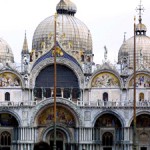
It has frequently been assumed that Grandi remained at San Marco until he accepted the position as chapel master at Santa Maria Maggiore in Bergamo in March 1627. However, there are many indications that he left St. Mark’s earlier. He had been relieved of his duties as maestro di canto at the seminary by March 1626, and Giovanni Rovetta makes clear in the dedication to his Salmi concertati (dedication dated 1 January 1626), that the post of vice-maestro at St. Mark’s was already vacant and that he had been performing some of the duties associated with the position:
I hoped thereafter [i.e., after joining the cappella] to be able to exercise the duties of vice-maestro in the absence of the Maestro di Capella, this position already being vacant beforehand. Nor was the thought that I might succeed at this in vain, for since this need occurred shortly after I ...

In the second of a three part biographical essay, Steven Saunders discusses the decade that Alessandro Grandi spent in Venice, the period from which most of the music Magnificat will be performing in February was drawn.
Grandi’s short tenure at the cathedral in Ferrara lasted at least through early 1617, since the second impression of the Primo libro de motetti (Venice: Giacomo Vincenti, 1617), as well as the second reprinting of the Madrigali concertati (Venice: Giacomo Vincenti, 1617) still identify him as maestro di cappella there. By 31 August, however, he had returned to Venice to accept a post as a singer in the chapel of St. Mark’s at the relatively generous salary of eighty ducats per year. He quickly assumed additional responsibilities, first as head of the Compagnia di San Marco (from 22 September 1617), then as the singing teacher at the seminario gregoriano (from March 1618), and finally as ...

Alessandro Grandi (c. 1586-1630) was associated first with the Accademia della Morte, Ferrara, then as a singer and vice maestro under Monteverdi at St Mark’s Venice. In 1627, he became maestro of S. Maria Maggiore, Bergamo, where he died of plague in 1630.
In February, 2010, Magnificat will present concerts of music by Alessandro Grandi, a prolific and highly respected North Italian composer, who had languished under the shadow of Monteverdi for four centuries. Few of Grandi's compositions have been published in modern editions, but fortunately this situation will be rectified by the forthcoming publication of the composer's complete works by the American Institute of Musicology.
Steven Saunders, Dana Professor of Music Colby College and one of the editors of the complete works has graciously granted Magnificat permission to post the biography of Grandi that he has written that will appear in that publication.
The outlines of Alessandro Grandi’s biography have long been established, thanks to contributions by Francesco Caffi, Denis Arnold, Renate Günther, Jerome Roche, Martin Seelkopf, Maurizio Padoan, and James Moore. The broad contours of Grandi’s story are straightforward—so straightforward, in fact, that Arnold could distill their essence into just a few ...



